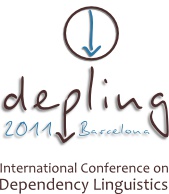

Depling 2011
Depling 2011 was held at the Pompeu Fabra University in Barcelona, September 5 to 7. It was organized by the TALN group of the technology department of the UPF.
The next confernce, Depling 2013, will be organized at the Charles University in Prague.
The Depling conference responds to the growing need for a linguistic conference dedicated to approaches in syntax, semantics and the lexicon that are centered around dependency structures as a central linguistic notion.
A short introduction to dependency can be found here
The proceedings are published as an open access publication: Proceedings
Two selections of articles proposing interesting connections of linguistic theories and natural language processing will appear in longer versions as books.
Theme

In general terms, the conference investigates:
- The use of dependency structures in the description of interesting syntactic and semantic phenomena, especially in a cross-linguistic perspective, including linguistic phenomena for which classical simple phrase-structure based models have proven to be unsatisfactory.
- The modelling of lexical phenomena and their role in the dependency view of linguistics.
- The applications of dependency analyses to natural language processing, including machine translation, parsing, generation, information extraction, etc.
- The use of dependency trees in syntactic analysis, description, formalization, parsing, generation, and corpus annotation of written and spoken texts.
- The use of semantic valency-based predicate and actancy graph structures and their link to classical logic.
- The elaboration of formal dictionaries for dependency-based syntax and semantics, including descriptions of collocations and paradigmatic links.
- Links to morphology and linearization of dependency structures, using for example topological field theories
- Dependency-like structures beyond the sentence as annotation scheme for discourse phenomena.
- The description and formalization of semantic and pragmatic phenomena related to information structure.
- History, epistemology, and psycholinguistic relevance of dependency grammar, including its relation to generative approaches to language
We are also interested in work on questions such as:
- What are the differences and similarities between theta roles, valencies, f-structures, TAG derivation trees, (subcategorization) frames, semantic role labelling, etc?
- Which corpus annotations using head-daughter relations on words are formally and linguistically equivalent, which are not?
- How to describe syntax-semantic interfaces between dependency structures?
People
Depling 2011 took place at the Pompeu Fabra University in Barcelona, organized by Leo Wanner (UPF), Lorraine Baqué (UAB), and the teams TALN (UPF) and flexSem (UAB).
The conference was chaired by Eva Hajičová (Charles University in Prague) and Kim Gerdes (Sorbonne Nouvelle, Paris).
Invited speakers: Igor Mel'čuk (University of Montreal) and Joakim Nivre (Uppsala University).
The complete program committee of the Depling 2011 conference
Related Event
The conference Depling 2011 was held in conjunction with the Fifth International Conference on Meaning-Text Theory to take place immediately after Depling 2011.

